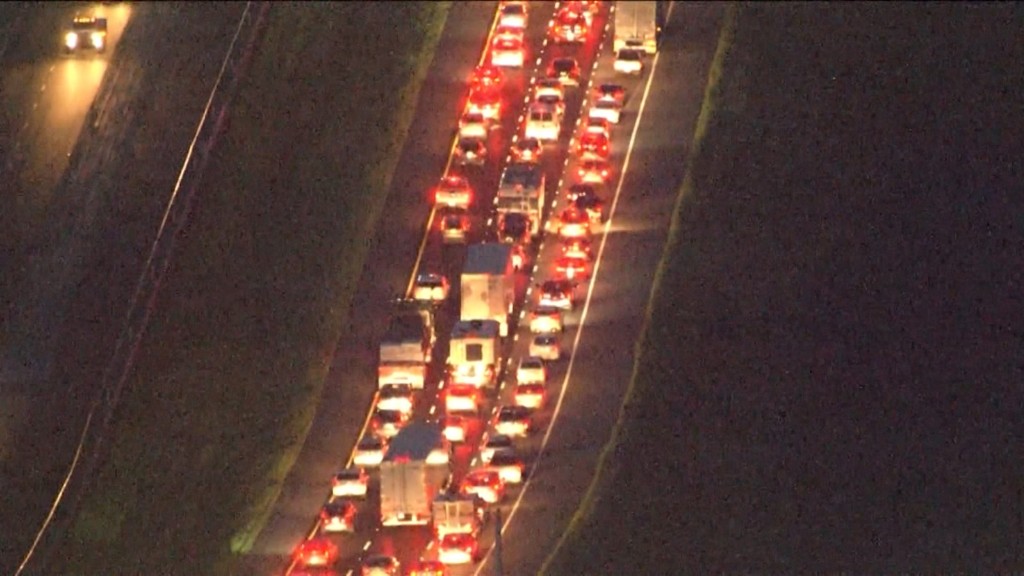
The last scheduled flight left Miami International Airport Friday evening as major airlines ceased operations in South Florida before Hurricane Irma slams the region.
Major carriers have largely closed up shop at Florida airports after flying as many passengers as possible out of the path of the storm and giving their staff time to prepare.
By late Saturday, Miami, Orlando and Fort Lauderdale - home to the 12th, 13th, 21st largest airports in the U.S., respectively - will be largely dormant as the extreme weather rolls in.
Meteorologists at Delta expect Irma to make landfall just west of Miami International Airport overnight Saturday, bringing wind gusts of up to 127 miles per hour.
Airlines are also getting aircraft out of Irma's path. Forecast winds are powerful enough to lift empty and stationary jetliners off the ground.
"If it flies, it's not going to be in south Florida," said Ross Feinstein, a spokesman for American.
By Saturday, its gates, ramps and hangars were empty, not a single American aircraft remained in Miami.
Irma has already trashed airports, buildings and roads in the Caribbean. St. Maarten, a major international destination for U.S. and European carriers, was in ruins after the storm. Photos from the Netherlands Ministry of Defense showed its runway covered in sand and widespread damage at its terminal building and jetways.
But the prospect of a direct hit from Irma represents another blow to U.S. air travel in one of the busiest air corridors in the world for business and leisure travel.
The Miami, Fort Lauderdale and Orlando airports handled more than 115 million passengers in 2016.
The scramble to get out of the hurricane's path was so acute that the Federal Aviation Administration on Thursday evening said air traffic controllers were increasing the space between flights from Miami and nearby Fort Lauderdale to enable them to better manage the crowded skies. And American Airlines (AAL) was briefly under an FAA ground stop in Miami due to rerouting outbound aircraft.
The airline added 16 extra flights from Miami on Thursday and another seven on Friday, enough room for more than 4,000 passengers. The Fort Worth-based carrier said it has canceled more than 2,500 flights as of Friday stretching through Sept. 11.
Related: Hurricanes Harvey and Irma may mess with the job market
The biggest single carrier in the Miami-Fort Lauderdale region is American, which accounts of 38% of the flying there, according to Morgan Stanley. Southwest Airlines (LUV) is the largest single operator in Orlando at 20%.
American will wind down operations in Orlando, which is a three and a half hour drive north from Miami, by 2 p.m. on Saturday. It is also shutting operations in Fort Lauderdale, Fort Myers and West Palm Beach.
Spirit Airlines said late Friday that it shuttered its Miramar, Florida headquarters and move its operations center to its backup in Detroit.
"Hundreds of Spirit Team Members left their homes in Florida behind to help make sure that the remaining Spirit flights not impacted by the storm could keep flying and we could recover operations as soon as possible," the airline said in a Facebook post.
Delta Air Lines (DAL) has also added 5,000 additional seats since Wednesday, with flights out of Florida and Caribbean islands, including the Bahamas, Dominican Republic and Jamaica.
One Friday Delta flight out of Orlando also includes a Boeing 747-400. The aircraft took what was supposed to be its last U.S. domestic revenue flight earlier this month, but was put into service as extra flights ahead of Irma.
Airlines and airports operate preparedness plans in 72, 48 and 24 hour markers, evacuating aircraft and personnel and preparing stations as part of a methodical checklist ahead of a storm's arrival, according to Ken Jenkins, principal crisis response strategist at NavAid Crisis Consulting Group.
The flight stoppages in Florida come just two weeks after Hurricane Harvey pummeled Texas, shuttering operations for several days at Houston's busy airports.
Miami announced Friday night via Twitter that the last scheduled flight had left its airport.-- an Air Europa flight to Madrid.
No Saturday or Sunday flights had been scheduled. Once sustained winds hit 55 miles per hour, aircraft cannot take off or land.
Air traffic controllers may shelter at lower levels in control towers or nearby buildings and will remain on duty, according to the FAA, "and are ready to go back to work as soon as the storm passes."
Related: Airlines scramble as they prepare for Irma
Commercial flights ceased at West Palm Beach Airport at 7:00 p.m., at Fort Lauderdale's airport at 7:45 p.m. and at Key West Airport at 8 p.m. on Friday. Orlando International Airport's final flight is scheduled for 5 p.m. on Saturday and Tampa's is closed to commercial flights as of 8:00 p.m. In Orlando, 50 knot winds will shut down the airport's outdoor tram which shuttles passengers between terminals.
The duration of any shutdown remains uncertain. American said any timeline for resumption of flights will be governed by not only airport conditions, but also the ability of airport and airline staff to get to work.
It's not just commercial airlines getting out of Irma's path.
Farther north in South Carolina, Boeing (BA) said it was suspending manufacturing operations starting on Saturday morning. The company's expansive North Charleston facility is flying out any 787 Dreamliner that's able to fly or bringing aircraft inside the factory, which is rated for a category five hurricane.
